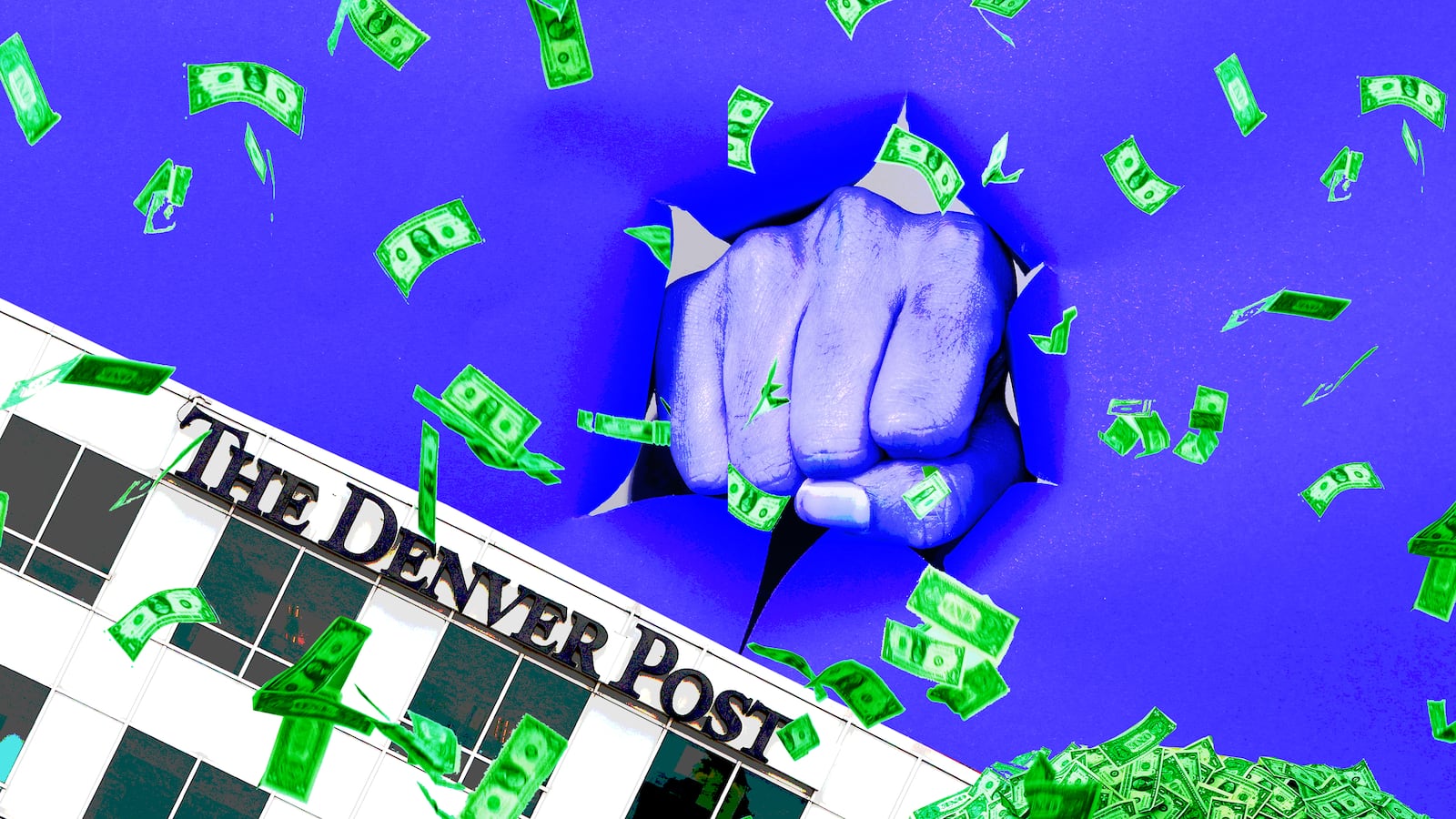It seems odd that they’re fighting for the right to speak at a place called The Lipstick Building.
Today, 150 journalists from the Denver Post, the St. Paul Pioneer Press, and the Mercury News, and 49 other smaller papers who are accustomed to reporting the news will become the news, as they protest the owner of their papers in what some have called “a fight for their lives.” Alden Global Capital has been surprisingly silent about its own employees calling it out for alleged “predatory business practices.”
Alden, which did not respond to The Beast’s attempts for an interview, is a hedge fund which has been demanding staff cuts to its papers around the country in order to keep healthy profits rolling in. According to reports, the operating margin for Digital First Media, which is controlled by Alden, is 17 percent.
The rally was organized and funded by the Newspaper Guild under the umbrella of the Communication Workers of America—a Hail-Mary by print reporters and photographers who have traveled to New York City from as far away as California, Minnesota, Michigan and Colorado to get the company that pays their salaries to pay attention. In their hands, an 11,000 signature petition asking Alden to invest or sell.
“We’re taking the message to Alden Global’s front door. They won’t reach out to us, so we’re going to go to them,” says Noelle Phillips, police reporter and vice chair of the Denver News Guild.” Phillips acknowledges that her public outbursts could come at the cost of her job, but what has she got to lose with such an uncertain future? “They need to share some of those profits... Feed them back into their newspapers and if they can’t do that, then they should let go of their newspapers.”
Phillips’ dissension was echoed by her colleague, Denver Post reporter John Ingold, who tweeted Monday: “The corporate owners of @denverpost have censored our pages and created an untenable climate of fear and intimidation in our newsroom. They must change course or sell.”
A look at the recent history of the Denver Post provides a good example of what life was like before Alden. A decade ago, the Post’s newsroom employed 310 people. Alden bought the paper in 2011. By this February, the Denver Post lost 30 percent of its newsroom to layoffs, leaving a staff of around 70 people.
What has followed at Denver’s only city newspaper is a jawdropping retreat of its leadership. It’s a movement which has become known as The Denver Post Rebellion.
On Friday night, two senior editors stepped down. Phones lit up as the news hit. One young digital reporter, who wished not to be identified for fear of reprisal, confided to The Daily Beast: “I’ve got to find another job. This is chaos.”
Things soon got worse. Within an hour, Dean Singleton, the paper’s well-respected chairman, who sits on the editorial board, also resigned, telling a local weekly, “It’s like watching your mother or father go into hospice.”
Those high-powered resignations followed the May 3rd departure of Chuck Plunkett, the fearless editorial page editor who, amazingly, survived the now-infamous column, “As Vultures Circle,” criticizing budget and staff cuts,
But he was shut down when he tried to buck Alden a second time with a new controversial editorial piece. This one slammed Alden after the dismissal of an editor at the Boulder Daily Camera who had published a scathing critique about the owners on a personal blog after Alden refused to publish it in the Camera. In an article for Rolling Stone on Monday, Plunkett appealed to the public to fight for the future of journalism, warning that if they don’t, the "rotting bones of our paper will be scattered over the high desert much sooner than feared.”
Reader response to Plunkett’s article was mixed—one person lamented, “Without a strong media, our democratic experiment will not succeed, and we need owners of papers who care about that, not about shareholders.” Another agreed, “No city the size of Denver should lose its only newspaper.” But others applauded the Post’s potential demise, noting, “to see a leftist propaganda rag like the Denver Post slowly collapse is a pleasure. Good riddance,” and “The Post can go the way of the Dodo.”
The reporters who traveled thousands of miles to New York to protest today are fine with being outed.
“The risk to our jobs is censorship and preservation of our newspaper. We’re here to defend journalism,” says Denver Post breaking news reporter Elizabeth Hernandez. Hernandez was an intern in 2014, hired in 2015, laid off the next year, only to be hired back early this year just three weeks before Alden gutted the newsroom. She survived that cut, but it’s lonely these days. “I’m the only reporter in the building on Saturdays. “It’s an impossible task to do those things well. I feel like I’m drowning in that sense,” she said.
The Denver Post is now reportedly left with only one person on the opinion page, who is on maternity leave; thus, Phillips and Hernandez do not know who their bosses will be when they return to work this week.
Besides the editors, two sports reporters left recently. Reporters don’t even know how many people still work in the newsroom, they said, because the remaining bosses they’ve asked say they’re not allowed to tell them.
They are not following that example. Secrecy is not their beat.
“We are not going to shut up,” says Phillips. “ Alden, we’re coming to see ya. We hope you answer the door.”
It’s their job to shine a light, even if it’s on themselves.






